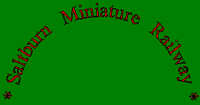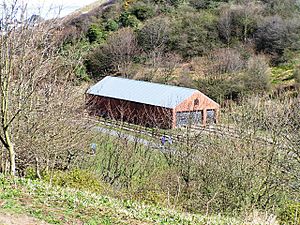Saltburn Miniature Railway facts for kids
Quick facts for kids Saltburn Miniature Railway |
|
|---|---|
 |
|
| Overview | |
| Locale | England |
| History | |
| Opened | 1947 |
| Technical | |
| Line length | 1⁄2 mile (0.8 km) |
| Track gauge | 15 in (381 mm) |
The Saltburn Miniature Railway is a fun, small train line in Saltburn, England. It uses a special narrow track, only 15 inches wide! This railway is located in Redcar and Cleveland, North Yorkshire. It's a popular place for visitors to enjoy a ride.
Contents
History of the Saltburn Railway
The Saltburn Miniature Railway first opened in 1947. It was built to be a fun place for tourists to visit. At first, it was a simple line that went out and then came back. There was one station at each end of the track.
In 1953, the railway was changed a bit. This allowed two trains to run at the same time. However, there wasn't a special loop for trains to pass each other easily. Instead, one train had to back up into a siding (a short side track) to let the other train go by.
Big Changes and Volunteers
During the 1980s, a group of volunteers took over running the railway. These supporters decided to make the railway even better. They planned a big project to make the track longer. They also moved one of the stations and built new sidings and engine sheds. This huge project was called 'The Big Transformation'. It took place between September 2000 and April 2003.
Exploring the Railway Route
The railway track starts at Cat Nab Station. This station is located right by the beach. From there, the line goes south for about half a mile. It travels inland to a place called Forest Halt. At Forest Halt, you can find a nice woodland walk and pretty gardens.
Each end of the track has a special run around loop. This loop lets the engine move from one end of the train to the other. Near the middle of the line, there's a depot. This is where the engines and other railway vehicles are stored and looked after.
Meet the Locomotives
For a long time, Prince Charles was the main engine on the railway. It had been working since 1953! But now, the new operators have added more trains. They have a lighter engine for work trains. They also bought a new main engine called "Saltburn 150". This engine was rebuilt by the Saltburn Miniature Railway Association (SMRA) and is now running. Another steam engine, "Blacklock R", was also bought and rebuilt by SMRA. It is now in service too.
| Train Name or Number |
Train Type | Year Built | Year Arrived at Saltburn |
Builder | Still Running? | Notes |
|---|---|---|---|---|---|---|
| Old Trains | ||||||
| No 7 | 2-4-0PM | around 1930 | 1947 | Parkinson | No - stopped 1948 | Looked like a steam train. Only ran for the first year. |
| Blacovesley, later Elizabeth |
4-4-4D | 1909 | 1948 | Bassett Lowke | No - stopped around 1960 | Looked like a steam train. It has visited the railway again after being fixed up. |
| Current Trains | ||||||
| Prince Charles | 4-6-2DE | 1953 | 1953 | H N Barlow | Yes | Looks like a sleek steam train, painted green. It was the main engine for many years. |
| George Outhwaite | 0-4-0DH | 1994 | 1994 | SMR Assoc | Yes | Looks like a steam train, painted red. Used for moving wagons and sometimes for passengers. |
| Saltburn 150 | 4-6-2DH | 1972 | 2006 | Artisair, rebuilt SMRA 2011 | Yes | Looks like a steam train, painted blue. |
| Blacklock R | Template:Whyen | 1992 | 2013 | Rebuilt by SMRA 2015 | Yes | A real steam train, painted black and red. |
Other Railway Vehicles
When the railway first opened in 1947, passengers had to sit in simple freight wagons. These were like small open wagons with basic seats. But for the 1948 season, the railway got two proper passenger coaches. These coaches had seats that could be flipped to face the direction the train was going.
In 1953, four new passenger coaches arrived. Each of these could seat 16 people. The two older coaches were later removed from service. When the current volunteers took over, they used the last two of the 1953 coaches for a short time.
Today, the railway has four modern passenger coaches. They are made of metal. Three of these coaches are enclosed, meaning they have roofs and sides. One coach is open, so you can feel the breeze! Three of these coaches also have outside platforms for a guard to ride on.
The railway also has three special wagons for work. These include a general works truck, a tanker truck, and a wagon that carries an air compressor.
 | Sharif Bey |
 | Hale Woodruff |
 | Richmond Barthé |
 | Purvis Young |


